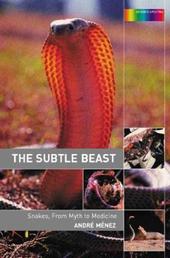
|
The Subtle Beast: Snakes, from Myth to Medicine
Paperback
Main Details
| Title |
The Subtle Beast: Snakes, from Myth to Medicine
|
| Authors and Contributors |
By (author) Andre Menez
|
| Physical Properties |
| Format:Paperback | | Pages:176 | | Dimensions(mm): Height 229,Width 152 |
|
| Category/Genre | Reptiles and amphibians as pets |
|---|
| ISBN/Barcode |
9780415284981
|
| Classifications | Dewey:597.96 |
|---|
| Audience | | General | | Undergraduate | | Postgraduate, Research & Scholarly | | Professional & Vocational | |
|---|
| Illustrations |
30 b&w line drawings, 40 colour photographs
|
|
Publishing Details |
| Publisher |
Taylor & Francis Ltd
|
| Imprint |
Taylor & Francis Ltd
|
| Publication Date |
1 May 2003 |
| Publication Country |
United Kingdom
|
Description
The Subtle Beast: Snakes, from Myth to Medicine introduces you to the complex and absorbing world of these mysterious creatures. Each of the fourteen chapters in this volume can be read independently, but read together they trace a fascinating journey from the macroscopic features of snakes to the molecular description of their venom components. The first three chapters detail how snakes inspired fear and worship, served as sources of medicine, and represented good and evil throughout the ages. The remaining sections describe much of the scientific work that has eroded these supernatural beliefs during the past three centuries. The book examines the origin, features, and classification of snakes, and also offers a precise description of snake venoms and their components. The final chapter discusses how venoms can be applied toward medicinal purposes. Illustrated with a wealth of full color figures, this volume explains technical topics in language that is understandable to an educated lay audience. About the Author Andre Menez is the Director of the Department of Protein Engineering at the Commissariat a l'Energie Atomique (CEA) in France. He heads the Laboratory of Protein Chemistry and is Professor at the National Institute of Sciences and Nuclear Techniques. His knowledge of the toxins of venomous animals inspires his study of proteins for the development of new antivenins and drugs. He is a recipient of the Redi Award from the International Society of Toxicology.
|